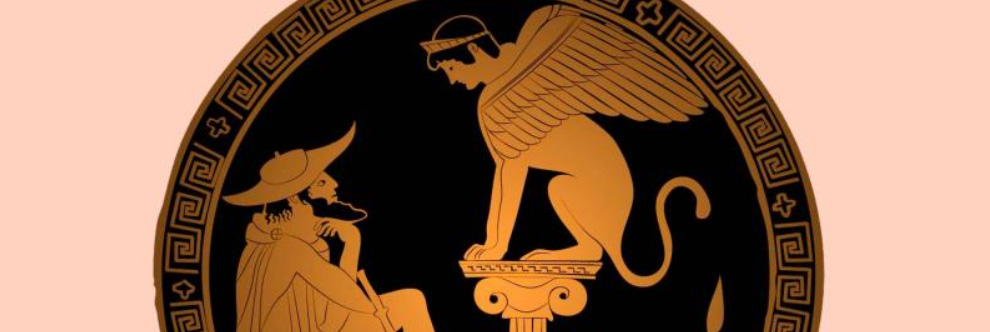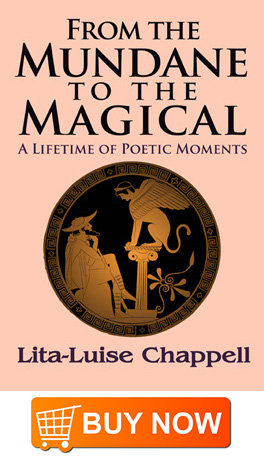From the Mundane to the Magical:
A Lifetime of Poetic Moments
“From the Mundane to the Magical is an ambitious poetic history written by an author who sincerely appreciates each facet life enshrines. Touching on war, environmental issues, modern technology, and our ever-changing world, Chappell is a generous author whose honesty is tangible. Readers are taken on a magic carpet ride from Alaska to the Mediterranean, Asia, and beyond. Captured here is the true essence of culture, people, and animals from all edges of the world. Nuances of rose quartz, Dickinson, and Parker are present in the poems written and inspired by the many experiences of love and loss, which truly inspire an open mind and heart. And, if that wasn’t enough for the average reader, the magic abounds with a series of folkloric poetry to set the imagination afire.” – Apryl Skies, A Song Beneath the Silence
Available in Paperback and Kindle formats.
Published 2014 by Sybarytic Press | 188 pages | ISBN: 1495120058 | ISBN-13: 978-1495120053
Dear Reader, I know you’ll enjoy the poems in From the Mundane to the Magical: A Lifetime of Poetic Moments. I’m proud and honored to have been entrusted with publishing Lita’s work, for so many reasons, the most important reason being that she remains true to her calling as a poet – to awaken the sleepers.
– Marie Lecrivain, Publisher, Sybaritic Press, August 2014
FROM THE FORWARD:
One of my favorite memories is of the first time I met Lita-Luise Chappell at Golden Lotus Oasis (Fall 2007 e.v.). She was – and still is – the embodiment of gracious hospitality. What I remember most from that afternoon are two things. First, I committed to my decision to take my Minerval initiation into Ordo Templi Orientis. Second, Lita shared some of her poetry with me. To hear Lita recite poetry, especially works of her own creation, is akin to hearing the voices of Calliope and Erato, as well as Blake and Tennyson. It’s an altogether pleasurable and sensual experience.
Sadly, I can’t wholly transfer that particular experience to the page, but the reader who delves into From the Mundane to the Magical will find a banquet of poetry artfully arranged (by Lita herself), into the following sections: travel (“Patpong Girls”), political commentary (“The Fault of Faith”), love found (“My Treasure Box”), love lost (“No Man”), magical works (“The Twilight Goddess”), special moments (“Who Makes Us Wise”), and as an added bonus, three epic poems.
While many of the poems in From the Mundane to The Magical are formal in form and tone, the language, as well as their subject matter, are thoroughly modern. As a poetry editor/publisher, I fear for the loss of classical forms. Increasing numbers of contemporary poets eschew the sonnet, the madrigal, and the quatrain in favor of blank verse or poetic prose. Lita is a poet who’s not afraid to fuse the classical with the quotidian, and the sacred with the profane. This is, in my opinion, what makes her poetry unforgettable. She’s a poet who fearlessly adapts with the times to the point of shaking the foundations of the universe (hers, and her readers), as in the poem “Who Makes Us Wise?” a poetic discourse that echoes Peter Abelard’s treatise “Sic et Non”:
Who is the planner, the supervisor?
Who is the criticizer, then the compromiser?
Who is the chastiser then the apologizer?
Who is the eulogizer, and then the baptizer?
Who is the advisor, then the patronizer?
Who is the organizer and then is the reviser?
Who is the exerciser and then the mobilizer?
Who is the disguiser and the improviser?
Who is the despiser and then the sympathizer?
Who is the dramatizer and then the solemnizer?
Who is the upriser and then the realizer?
Who is the merchandiser and then the surpriser?
Who brings us lessons to be learned?
How could they be so unconcerned?
Are these lessons so hard earned?
For when each one is so discerned,
Their truths just make us that much wiser.
REVIEWS:
From Meg Elison, author of The Book of the Unnamed Midwife
An autobiography is seldom told strait-out. It can be pieced together out of a diary, a lifetime of letters, or the selected remembrances that the write will tell. Lita-Luise Chappell has chosen to collect a life’s work in poetry that tells the tale of her life the way a fan-dancer does; in teasing glimpses and an elegant obfuscation.
 “Bask in the rich poetry of this remarkable woman”
“Bask in the rich poetry of this remarkable woman”
Review by Cynthia
This poet creates a beautiful journey of love, life and self realization which is a joy to experience. Read aloud the words drip from your lips like refined honey and show you strength and beauty within the heart. I enjoyed exploring the highs and lows of this poet’s life through her concrete imagery and would recommend this wonderful book to anyone who appreciates the capriciousness of life. Each poem is offered with an unabashed window into the life of a truly remarkable woman. Grab a glass of your favorite wine, settle near the fireplace and bask in the richness of the poems of Lita-Luise Chappell, I know you will enjoy it as much as I have.
 “Beautiful, thought provoking, inspiring and magickal”
“Beautiful, thought provoking, inspiring and magickal”
Review by Vajrayogini
An exquisite collection of poems that will stimulate your emotions, and resonate on many levels. Ms. Chappell takes you to wondrous, exotic places, She caresses you with love and lust, she elicits utter joy and chuckles, she provokes thought, and she inspires you with magick. A highly recommended collection of poems that you will return to again and again, You will have many favorites…
 Review by Sabrina
Review by Sabrina
Ms. Chappell is an amazing writer capable of bringing the reader along with her in wonderment. Not only is her writing very diverse subject wise, but she also tackles many styles of writing – especially more classic forms, with ease. She speaks on travel, politics, magick, love, and other subjects with a lyrical paintbrush, keeping the reader engaged and wanting more. I was lucky to have gotten to hear the writer read some of these works, because the emotion she conveys when reading these is absolutely beautiful.
 Review by Neil
Review by Neil
From the Mundane to the Magical, by Lita-Luise Chappell, is a collection of poems that radiate sincerity, optimism, love, and magic. The poems in this collection express the power and insight gleamed from someone who truly knows who they are, which inspires the reader to do the same. One of the central themes of these poems is the insight and wisdom gained through varied and diverse experiences. The prepositions “from” and “to” in the title are fitting, for these poems represent the journeys the author herself has undertaken. Whether those journeys be geographical, cultural, sensual, ecstatic, or magical, Chappell brings back insights from her life experiences and unifies them in poetic image-spaces that make them accessible to the experiential core of humanity within all of us.
Chapter I, Poetry about Travel, reveals a myriad of perspectives and reflections garnered from extensive travel. As the author says, in her own words, “Extensive travel not only made me appreciate all the differences that varying cultures offer, it also allowed me to appreciate how similar we all are with the same range of challenges and emotions…I became more tolerant and less judgmental toward others. In fact, the more I traveled the smaller the world became and my sense of family increased” (p. 1). In reading through these poems one gains the impression that each place traveled to reflects an expansion, or new vista and route, through the author’s poetic point-of-view. Whether the setting of the poem be Paris or Mexico, Croatia or Alaska, the author brings the aesthetic dimension of these locations into her own unique vision, synthesizing the diverse elements into a common bond of humanity, allowing the reader to appreciate the various facets of geography, and the modes of life they present. These poems are characterized by tolerance, respect, sensuality, diversity, freedom and a deep appreciation of what other cultures have to offer. The poems in this section that stood out me were: Getting Away, Life is a Road, Santa Maria Maggiore, Kioni of the Ionian Sea.
The poems in Chapter Two, Political Commentary, expresses genuine and heartfelt lament and rage at injustice suffered and a deep empathy for those who have experienced such injustice. As the author notes, in these poems, “There is a teenager’s protest, a woman’s lament, one on historical suppression, and another one sexual abuse” (p. 37). While the themes are general, they are at the same time universal, creating the impression of a kind of solidarity of expression, the author’s voice sometimes reaching to the voice of collective humanity. The poems in this section that stood out me were The Battle, A Woman’s Lament, and The Fault of Faith
Chapters Three and Four, Love Found and Love Lost represent two poles on a spectrum, the heights, ecstasies, and redemptive qualities of love, and on the other hand, the anxieties, fears, and losses that often accompany it. In Love Found one gets the impression that love and sensual pleasure serve as a beacon of light capable of guiding one through stormy weather. Not only is sensuality here spiritualized–raised, so to speak, to its highest pitch–but also seen as capable of being found and appreciated in a variety of forms and aspects. As Chappell notes, “The more I loved, the more I realized that the heart has a great capacity for loving many at the same time” (p. 49). Just as the author finds insight and understanding in diverse geographical location, so too does she find it in the diversity of the expressions of love. This chapter was, for me, inspiring. Poems that stood out to me were: Life of Love, Oh Endless Moon, Spell of the Morning, The Treasures of Our Lives, and The Edge. The poems in love Lost swing to the opposite end of the spectrum; yet, the reader is encouraged to find joy wherever love has left its mark. Chappell writes, “with the heartache that comes from each ending relationship, we eventually learn that love was not truly lost, for love was found and felt (p. 77). Highlights for me in this section were: Love Must Never Stop, Lovers, What Dost Thou Sayeth, and We Three.
In Chapter Five, Magical Works, the theme of travel and diverse experience once again emerges. Magical and mystical journeys now take central stage. As opposed to physical, external travel, these poems seem to represent the journey inwards and what we find in ourselves in these more ethereal and magical moment of our lives. The poems are filled with healing, joy, wonder, and respect. On top of this, several of the poems, such as The Silver Almond Full Moon Spell and Prayer for Good Luck can be used directly, and practically, as spells, in one’s own personal practice. Other poems are also well suited for invocatory purposes. Poems that stood out to me were: The Glories of Our Nature, A Puja for Babalon, The Old Magician, Ode to the Shroom, Thy Life is Thy Garden, and Leda and Her Swan.
Chapter Six, Special Moments, harkens to those moments in our lives that fructify and fortify us on our particular paths. The poems appear to represent those high water marks of our lives, expressing a gratitude for what has transpired, either good or bad, as necessary steps toward a full understanding and embrace of our own Nature. Poems in this section that stood out to me were: It’s a Good Day, The Searcher, Look to Yourself, The Blessings of a Sailor, The Edge of Death, and If I Should Pass Over.
In Chapter Seven, Poems of Great Length, Chappell departs from the short poem and brings the reader deeper into her narrative structures. The first poem, Come Unto Me Said The Boundless Queen of Space, is an excellent presentation of the perspective of the Goddess Nuit, the Goddess of “Infinite Space, and the Infinite Stars thereof”. This poem should be of particular interest to anyone working with the Gods/Goddesses of the Thelemic pantheon, or, with the Goddess in general. The next poem, The Late Chace Meeting, is both entertaining and moving, and highlights what I take to be one of Chappell’s greatest virtues in these poems: Optimism and courage in the face of adversity and tragedy. I hope to see similar narrative style poems from Chappell in the future. The final poem, The Town with the Feathery Crest, is a tale that imparts the ideals of ingenuity and bravery.
I would recommend this collection of poems to anyone pursuing a mystical or magical path, for the poems radiate the sincerity, balance, and passion of one who has walked that path for most of their life. Chappell’s poems communicate the ideals of experience, tolerance, love, optimism, and care, and are a great gift to anyone seeking their own truth. In particular, Chappell’s poetic expressions give insight into the outlook on life born out of a deep seated spiritual orientation to the world and proves a source of guidance for all who walk such a path.


 The official website of Lita-Luise Chappell, writer on sex, magic, food, distant lands, and everyday life with articles, poetry, novels, travelogues, rituals, cookbooks, and short-stories.
The official website of Lita-Luise Chappell, writer on sex, magic, food, distant lands, and everyday life with articles, poetry, novels, travelogues, rituals, cookbooks, and short-stories.
